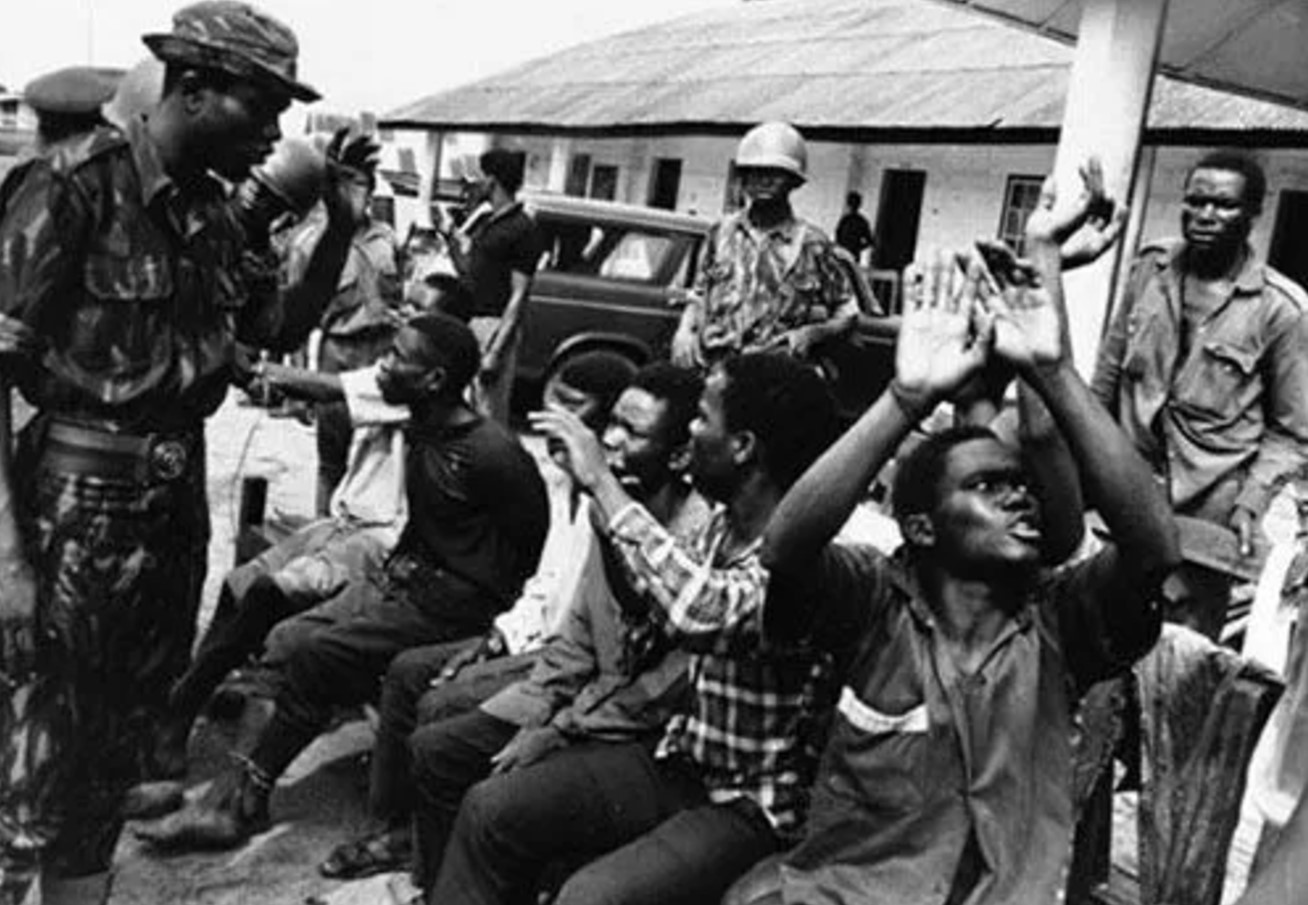Various factors have stirred up conflicts among ethnic, religious and political groups in Nigeria. Religious, political and ethnic nationalism has led to riots and conflicts about control of power, state collapse, unequal allocation of resources, economic decline and ethnoreligious clashes in Nigeria.
Some of these clashes could well have been avoided while some, on the other hand, were inevitable. Whichever way, these riots will forever remain dents in the beautiful historic of Nigeria.
Lagosreporters brings you the top 5 historical riots/wars in Nigeria that almost destroy the country. It is worthy of note that these riots or wars happened after the amalgamation of northern and southern protectorates in 1914…Click Here To Continue Reading>> …Click Here To Continue Reading>>
5. Adubi War of 1918

The Adubi war, also known as the Egba Uprising broke out in 1918, between June and August, as a result of the taxation system introduced by the British colonial government in Abeokuta, the present capital of Ogun State, Nigeria.
OldNaija gathered that more than thirty thousand (30,000) Egba people went to war against the colonial officials in Abeokuta, destroying many railway and telegraph lines in the southern part of the territory.
The Adubi war was mainly caused by the introduction of the direct taxation system on the Egba people as well as the cancellation of Abeokuta’s independence in the year 1918. Read about Adubi war in full details here.
4. Aba Women’s Riot of 1929

The riots or war led by women in the provinces of Calabar and Owerri in southeastern Nigeria in November and December of 1929 is known as the “Aba Women’s Riots of 1929” in British colonial history and “Women’s War” in Igbo history.
The roots of the riots evolved from January 1, 1914, when the first Nigerian colonial governor, Lord Lugard, instituted the system of indirect rule in Southern Nigeria. Under this system, British administrators ruled locally through “warrant chiefs,” essentially Igbo individuals appointed by the governor.
Within a few years, the appointed warrant chiefs became increasingly oppressive. Colonial administrators added to the local sense of grievance when they announced plans to impose special taxes on the Igbo market women.
The Aba women’s riots prompted colonial authorities to drop their plans to impose a tax on the market women and to curb the power of the warrant chiefs. Read about the Aba women’s riot in full details here.
3. Operation Wetie: Western Region Riots of 1962

The third on our list of historical riots/wars in Nigeria is Operation wetie. This was the name given to the series of riots that characterized both the political and civilian scene of the defunct Western Region of Nigeria in the 1960s. Operation wetie, in the context of the crises, means to douse or wet politicians, their properties and supporters with petrol and set them ablaze.
The bloody riots started with intra-party disagreements between the leader of the Action Group, Chief Obafemi Awolowo, and his deputy, Chief Samuel Ladoke Akintola. It all began when Chief Obafemi Awolowo gave up his post as the Premier of Western Region to seek power as the Prime Minister but lost and settled as the leader of opposition in the federal parliament.
Though the premiership mantle was handed over to Akintola, Awolowo still retained his post as the leader of the Action Group. However, Samuel Akintola did not reckon with Awolowo’s decision to remain the leader of the party and this brought about division of interest and loyalty in the Action Group. A faction of the Action Group pledged loyalty to Awolowo while another supported Samuel Akintola.
This caused serious uproar and unrest in the Western Region which later resulted in chains of violence. Several people were killed and properties worth millions were destroyed in days. Shortly after, a state of emergency was declared throughout the Western Region.
This became the first time in the history of Nigeria that a state of emergency would be employed to curb violence. Political opponents and their families were set ablaze and their properties too. Read about Operation Wetie in full details here. READ FULL STORY HERE>>>CLICK HERE TO CONTINUE READING>>>
2. Kano Riot of 1953

Another one in this list of historical riots/wars in Nigeria is the Kano riot of 1953. In March 1953, a member of Action Group (AG) in the House of Representatives, Chief Anthony Enahoro, moved a motion requesting that Nigeria should be granted self-government in 1956.
The leader of the Northern People’s Congress (NPC), Sir Ahmadu Bello, moved a counter-motion. He proposed an amendment that self-government should be granted “as soon as practicable”. This led to disagreements over the motion and equally resulted in a strained relationship between the Northern and Southern leaders.
OldNaija gathered that the meeting of the House was adjourned and members of NPC were booed and called all sorts of names before they left Lagos for the North. A retaliatory move was made by Northern leaders in Kano to avenge humiliation they faced in Lagos after the self-government motion adjournment on March 31, 1953.
It was while Akintola and his group were in Kano that a riot broke out which is later known in history as the 1953 Kano riot or Kano riot of 1953. Several people lost their lives in the riot and scores were wounded. Read about the Kano riot of 1953 in full details here.
1. Nigerian Civil War/ Biafran War

The Nigerian Civil War, also known as the Biafran War, broke out between July 6, 1967, and January 15, 1970. This bloody war caused by the attempted secession of the southeastern provinces of Nigeria as the self-proclaimed Republic of Biafra.
Created as a colonial entity by the British, Nigeria was divided between a mainly Muslim north and a mainly Christian and animist south. Following independence in 1960, three provinces were formed along tribal lines, the Hausa and Fulani (north), Yoruba (south-west), and Igbo (south-east).
Tribal tensions increased after a military coup in 1966 which resulted in General Aguiyi-Ironsi, an Igbo, taking power as Head-of-State. This was followed by a northerner-led counter coup a few months later. Aguiyi-Ironsi was killed and widespread reprisals were unleashed against the Igbo.

Fearing marginalization within the state, on May 30, 1967, the Igbo-majority province declared its independence as the Republic of Biafra. Initially, its forces pushed back the Nigerian army but after a year of fighting, a stalemate developed.
The Republic of Biafra lost its oil fields which were its main source of revenue and without the funds to import food, an estimated one million of Biafrans died as a result of severe malnutrition.
On January 11, 1970, Nigerian forces captured the provincial capital of Owerri, one of the last Biafran strongholds, and Ojukwu was forced to flee to the Ivory Coast. Four days later, Biafra surrendered to Nigeria. Read more about the Nigerian Civil War/Biafran War here.
Bonus: Kaduna Riots of 2000

The Kaduna riots of 2000 were religious riots between Christians and Muslims over the introduction of sharia law in Kaduna State, northern Nigeria. The riots which began on the 21st of February, 2000 claimed between 200 to 1000 lives.
Some of the protesting Christian youth smashed vehicle windshields and disrupted the flow of traffic in the Kaduna metropolis. In retaliation, many homes, banks, shops and businesses belonging mainly to Igbo traders from eastern Nigeria were looted and vandalized by Muslim rioters.
In Aba, trouble began when the bodies of Aba natives were shipped from Kaduna. Aba residents, furious over the deaths, attacked Muslim Hausa who live in the city and burned the mosque. Violence was also reported in the nearby towns of Owerri and Umuaha.
OldNaija gathered that President Olugusen Obasanjo appealed to both Christians and Muslims “to desist from violence” and the government sent elite troops to Aba. Kaduna state governor, Ahmad Maikarfi, imposed a dawn to dusk citywide curfew and the military and police were put on high alert.
























